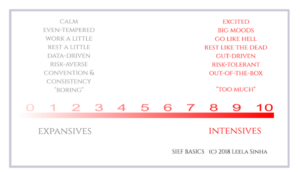
OEN NewsSIEF: Introduction to Intensives & Expansives
I have never been good at restraint, but lately I’ve become even worse.
I’m not the only person that this seems to be happening to; it seems to be all around me.
People are running out of patience, running out of tolerance, running out of bandwidth for anything that reads as nonsense and running out of bandwidth for hiding ourselves. For some people that hasn’t created much of a change, but for those of us with intense personalities–with fire in our bellies, with passion in our guts, it’s changing our worlds.
I didn’t always know this was what was going on. For a while I was a very quiet child, and then I was a very angry child, and it wasn’t until a few years ago when I was stuck lying in bed for 6 months recovering from an injury that I realized something critical:
This is not a flaw. There’s nothing wrong. Being loud and opinionated and creative and innovative and not having room for nonsense?
This is who I am…and not only is this who I am. This is who we are.
It shook my world to realize I’m not alone. There are a lot of us out here. And once I knew that, I decided we needed language to talk about ourselves. Positive language. Non-pejorative language. Language we could be clear about, nonjudgmental about, proud about, even.
So I developed the SIEF–the Sinha Intensive/Expansive Framework. It describes levels of intensity in behavior on a ten point scale. Intensive is at the upper end, and expansive–people who are less intense–are at the lower end. It’s a continuum, of course.

…and we tend to start a lot of companies. We tend to be entrepreneurs–why?
Well…because we’re pretty sure that we’re right and we’re pretty sure that we can do it better and we’re pretty sure we can do it ourselves.
Remember the Little Red Hen? “I can do it myself?” She’s often our hero, although if we’re smart? we build communities around ourselves, and we don’t leave ourselves to flounder through everything alone.
And yes, I do mean we form communities around ourselves. We are often the people that gather the people, and honestly, we often kind of like it that way.
Being an intensive is incredibly powerful and it is also incredibly draining. The world isn’t really built for people like us. The world is built for a more even-keeled, steady, predictable sort of person, the ones represented at the left side of the continuum, from zero to five. Those are the people that I call expansive–and we love them, too. They are vital, they are brilliant, they are the balance for us, but unfortunately, that’s not how we’re taught to think about each other. They are just very different from intensives.
Expansives accuse intensives of being obnoxious and arrogant and cocky and frustrating and childish and impulsive and unpredictable and unreliable, and intensives accuse expansives of being boring and stuck, and slow and cranky and too bound to tradition to understand what innovation even looks like.
This two-way contempt doesn’t help anybody, but it’s reinforced by our lives, by the worlds we live in, by the people around us, and by the structures we move through.
Imagine though. Imagine just for a moment: imagine a world where we appreciate each other. Imagine a world where you only do the things you do really well and where you can pass off the things that you don’t do well to someone else who loves them.
That should be the advantage of working in any kind of collective, any kind of group, any way except absolutely solo. But that’s not often how it goes down. The contempt and the miscommunication take over, and next thing you know, you’re cursing group work as though you’re in 8th grade and this is a science project you all have to pass.
But notice: intensives usually see the big picture. We can imagine things that nobody else can imagine. Expansives are steady and careful and wise in their slowness. Intensives are not good at slowness. intensive start things; expansives continue things. Expansives finish things. Intensives stop after 80% of the project is done because we’re bored. Expansives sometimes have a hard time getting out of “the way it’s always been done” into something better. They like tradition. They like duty. They like continuity and predictability, but intensives like novelty. We are complementary.
Especially in our companies, we need both. We need each other. We need the whole–the whole set of skills, the whole set of our combined humanity. Sometimes we want to hire someone who is willing to dive in and do whatever it takes and stay up late and come in early and then collapse at the end. And sometimes we need someone who will come in and work for an hour a day every weekday, weekends off, exactly a little bit exactly all the time all day.
We need both. Which means we need to hire both, on purpose, for the right jobs. And then we need to keep everyone happy.
I can revel in having somebody who loves to make sure that that zero comes out in the bottom right hand side of the spreadsheet. They, in turn, can relax, knowing that nobody is asking them to force themselves into innovation, into creativity, having ideas, into emotional highs and lows that they don’t want. They’d like to be moderately happy and appropriately sad and not more than that.
That’s the beauty of us together. Is that we can be ourselves. We don’t need to be everything Intensive can be intensive. Expensive can be expansive. We can trade and hire and delegate and share and appreciate…and celebrate.
And that has real-world, bottom line impact.
Less stress and conflict on the team. Higher productivity. Better communication and understanding.
That leads to better retention and better efficiency.
And in outreach and marketing? Knowing if your clients and customers are intensives or expansives tells you what your people need. Think about the difference between Apple under Steve Jobs and Apple under Tim Cook. They used to market to intensives: edgy, sexy, stand-around-the-block-all-night, bleeding edge technology. Now they market to expansives: calm. Predictable. Reliable. Everything shifted…but it might just be shifting again, because VR and AR are new tech–the province of intensives, of early adopters, of paying way more to be the first kid on the block, even if it’s not stable yet. Even if it’s an experiment.
If you recognize yourself as an intensive, or if your team is having weird friction you can’t quite put your finger on, I’m available for coaching and consulting. Let’s work it out so everyone has a job they can love, where they can shine, and where they can get their needs met and supported while still bringing in the business…including you.
ABOUT SIEF
The Sinha Intensive/Expansive Framework (SIEF) is a new way of looking at how you and your employees think, make decisions, and interact with the world. It’s intrapersonal, it’s leadership, it’s organizational, and for many people, it’s revolutionary.
Find out more about Intensive/Expansives and how to consult: Intensives Institute or You Are Not Too Much
Connect with Founder Leela Sinha on LinkedIn, follow them on TikTok, Podcast – PowerPivot, and grab their book You Are Not Too Much on Amazon.
